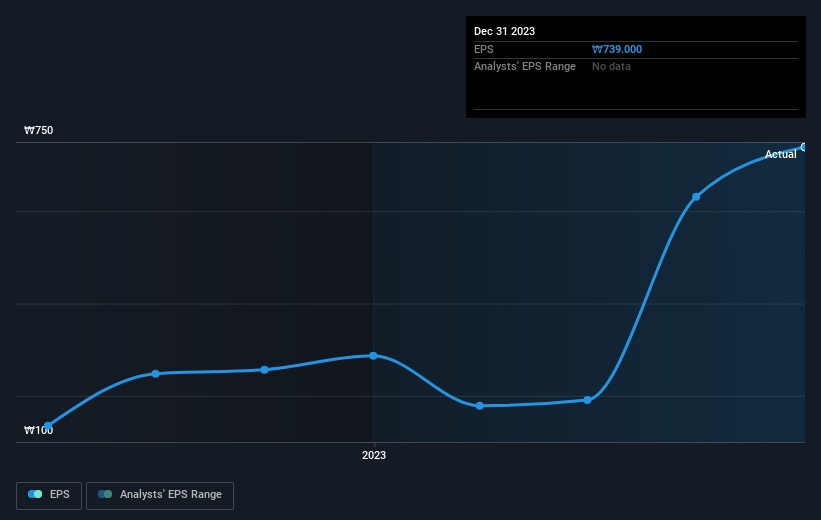Stock Analysis
- South Korea
- /
- Communications
- /
- KOSDAQ:A211270
The 12% return this week takes Asia Pacific Satellite's (KOSDAQ:211270) shareholders five-year gains to 163%

When you buy shares in a company, it's worth keeping in mind the possibility that it could fail, and you could lose your money. But on the bright side, you can make far more than 100% on a really good stock. One great example is Asia Pacific Satellite Inc. (KOSDAQ:211270) which saw its share price drive 154% higher over five years. On top of that, the share price is up 15% in about a quarter.
The past week has proven to be lucrative for Asia Pacific Satellite investors, so let's see if fundamentals drove the company's five-year performance.
Check out our latest analysis for Asia Pacific Satellite
While markets are a powerful pricing mechanism, share prices reflect investor sentiment, not just underlying business performance. One flawed but reasonable way to assess how sentiment around a company has changed is to compare the earnings per share (EPS) with the share price.
During the five years of share price growth, Asia Pacific Satellite moved from a loss to profitability. That kind of transition can be an inflection point that justifies a strong share price gain, just as we have seen here.
You can see below how EPS has changed over time (discover the exact values by clicking on the image).

We know that Asia Pacific Satellite has improved its bottom line over the last three years, but what does the future have in store? Take a more thorough look at Asia Pacific Satellite's financial health with this free report on its balance sheet.
What About The Total Shareholder Return (TSR)?
We've already covered Asia Pacific Satellite's share price action, but we should also mention its total shareholder return (TSR). The TSR is a return calculation that accounts for the value of cash dividends (assuming that any dividend received was reinvested) and the calculated value of any discounted capital raisings and spin-offs. Asia Pacific Satellite hasn't been paying dividends, but its TSR of 163% exceeds its share price return of 154%, implying it has either spun-off a business, or raised capital at a discount; thereby providing additional value to shareholders.
A Different Perspective
Asia Pacific Satellite shareholders gained a total return of 2.1% during the year. But that was short of the market average. It's probably a good sign that the company has an even better long term track record, having provided shareholders with an annual TSR of 21% over five years. It's quite possible the business continues to execute with prowess, even as the share price gains are slowing. Before forming an opinion on Asia Pacific Satellite you might want to consider these 3 valuation metrics.
Of course Asia Pacific Satellite may not be the best stock to buy. So you may wish to see this free collection of growth stocks.
Please note, the market returns quoted in this article reflect the market weighted average returns of stocks that currently trade on South Korean exchanges.
Valuation is complex, but we're helping make it simple.
Find out whether Asia Pacific Satellite is potentially over or undervalued by checking out our comprehensive analysis, which includes fair value estimates, risks and warnings, dividends, insider transactions and financial health.
View the Free AnalysisHave feedback on this article? Concerned about the content? Get in touch with us directly. Alternatively, email editorial-team (at) simplywallst.com.
This article by Simply Wall St is general in nature. We provide commentary based on historical data and analyst forecasts only using an unbiased methodology and our articles are not intended to be financial advice. It does not constitute a recommendation to buy or sell any stock, and does not take account of your objectives, or your financial situation. We aim to bring you long-term focused analysis driven by fundamental data. Note that our analysis may not factor in the latest price-sensitive company announcements or qualitative material. Simply Wall St has no position in any stocks mentioned.
About KOSDAQ:A211270
Asia Pacific Satellite
Asia Pacific Satellite Inc. develops and manufactures satellite communication devices worldwide.
Flawless balance sheet with solid track record.

